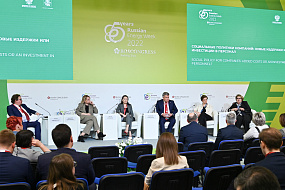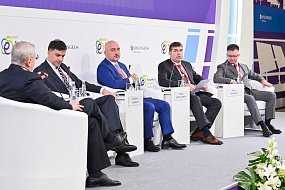Construction of Charging Stations and Government Support for Investors: REW 2022 Session Addresses Development of Electric Car Industry

Participants in the session ‘Greening Transport: Electric Vehicles and Hydrogen’ at the Russian Energy Week International Forum 2022 (REW) discussed the creation and development of technological infrastructure for the production and use of electric vehicles in Russia. The session was organized by the Russian Energy Agency of the Ministry of Energy of the Russian Federation and the Roscongress Foundation with the support of the Ministry of Energy of the Russian Federation.
In August 2021, the Russian government approved the Concept for the Development of the Production and Use of Electric Vehicles, which calls for preparing technological infrastructure for the mass production of electric vehicles in Russia by 2024.
“A year after the Concept was approved, we understand that the foundations that were incorporated into it have already been manifested in practice. First, we are definitely seeing a very high growth rate in electric vehicles in the country: the market tripled in 2021 alone. As of 10 October 2022, around 22,000 electric vehicles were registered in Russia, according to the traffic police. So we believe that the initiative drafted by the government is extremely pertinent,” Deputy Minister of Economic Development of the Russian Federation Maxim Kolesnikov said.
This year, pilot regions were identified for the establishment of charging infrastructure, which consists of stations with capacity of 150 kW that can simultaneously charge two electric vehicles. This year, 44 charging stations have been set up, and there are plans to build 528 more. There should be 970 in 2023 and over 1,400 in 2024.
“The parameters of the charging stations that were identified in terms of their localization and technological scope have made it possible to keep our industry occupied. And it’s not just one manufacturer; there are six or seven of them,” Kolesnikov said.
Two special investment contracts for the production of electric cars have been signed in an effort to develop the electric car industry in Russia. The first models are already being assembled in the Lipetsk Region. By the end of this year, Motorinvest plans to produce 2,500 Evolute i-Joy electric cars.
In addition, based on instructions from the Russian President, the Russian Government and the Rosatom State Atomic Energy Corporation signed an agreement on the development of electric power storage technologies in Russia, including portable ones. This was followed by the approval of a roadmap, which is currently being updated with the involvement of a wide range of representatives of the expert community, manufacturers, and consumers.
“We hope that we will submit the updated road map to the Russian government in the next two weeks. It has two main pillars. The first is the construction of a gigafactory in the Kaliningrad Region that we plan to complete in 2025. The second is the development of technologies for the circular economy, i.e., the processing of energy storage systems with the extraction of lithium-containing elements from them,” Rosatom Deputy Director for Technological Development Dmitry Ivanets said.
In terms of support for investors, the government is compensating them for a portion of their CAPEX and utility connection expenses. “It’s good to know that in addition to federal support, the pilot regions are also taking additional measures for consumers to stimulate the industry. Above all, of course, this involves reducing or abolishing the transport tax for electric vehicles and providing free parking. According to our data, 37 regions of the Russian Federation have already made a decision to either discount the tax for this type of transport or make it zero,” Kolesnikov said.
However, investors have faced problems in the process of introducing subsidies, with utility connections being chief among them. Chairperson of the Association for the Development of Electric, Unmanned, and Connected Transport and Infrastructure Iya Gordeyeva said that such connections had been free of charge until 1 July, but after this date, their cost began to include up to 50% of the cost of building new grid facilities from existing infrastructure and that this figure will be up to 100% starting from 1 January 2023.
“So in order to connect a charging station, an investor needs to invest up to [RUB] 12 million, which means building a [charging] station is very expensive. In this sector, of course, I would like to prolong those discounts and, perhaps, include compensation for utility connections in the cost of subsidies,” Gordeyeva said.
The second problem is the choice of sites for charging stations. There are numerous restrictions in this regard. Experts say that charging stations should be located in an open area and work around the clock.
“However, all the good stations are generally located on the territory of shopping and business centres. This is the traffic that ensures the regular arrival of electric vehicles. And, as a rule, these territories are closed at night with gates. It’s more profitable for an investor to set up a station where 12–15 cars will come over the course of a day than to put it somewhere in an open forest area, where no one will come at all,” Gordeyeva said.





